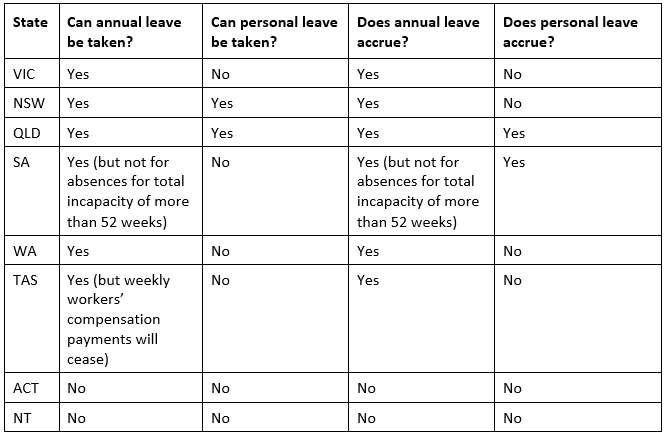Under the Fair Work Act 2009, an employee is not entitled to take or accrue paid leave such as annual leave and personal leave while that employee is also absent from work and receiving workers' compensation payments. The exception to this, as provided under section 130 of the Act, is where the applicable workers' compensation scheme 'permits' the worker to do so.
This exception has been the subject of some confusion. Workers' compensation legislation differs between states and it can be unclear as to whether it 'permits' employees to receive the dual entitlement. For example, section 49 of the Workers Compensation Act 1987 (NSW) says that workers' compensation is "payable...even though the worker has received or is entitled to receive in respect of the period of any payment, payment, allowance or benefit for holidays". This section is clearly contemplating the simultaneous receipt of both workers compensation payments and holiday pay, however it does not explicitly 'permit' the worker to take annual leave.
Fortunately for employers, a series of Full Federal Court decisions has clarified the matter. When section 49 of the New South Wales legislation was tested in the case of Anglican Care v NSW Nurses and Midwives' Association [2015] FCAFC 81, the Full Federal Court decided that the section was sufficient to permit the dual entitlement for accruing or taking annual leave while also receiving workers' compensation payments. Justices Bromberg and Katzmann stated that any section that "countenances the simultaneous receipt" of workers compensation and paid leave should be sufficient for both to be 'permitted'.
Following further cases such as Nursing and Midwifery Federation v Alfred Care [2017] FWCFB 4420 in Victoria, the position has now become clear in all States and Territories.
A summary is as follows:
If your employee is receiving workers' compensation, and the applicable box above contains a 'yes', you must ensure that your employee continues to accumulate or be able to take leave during their absence from work.
This publication does not deal with every important topic or change in law and is not intended to be relied upon as a substitute for legal or other advice that may be relevant to the reader's specific circumstances. If you have found this publication of interest and would like to know more or wish to obtain legal advice relevant to your circumstances please contact one of the named individuals listed.

